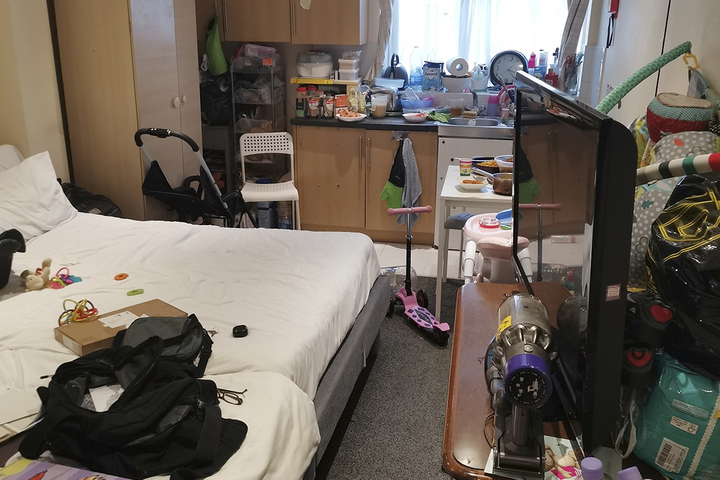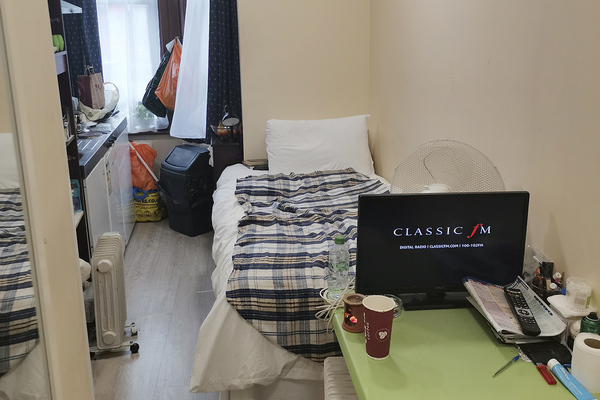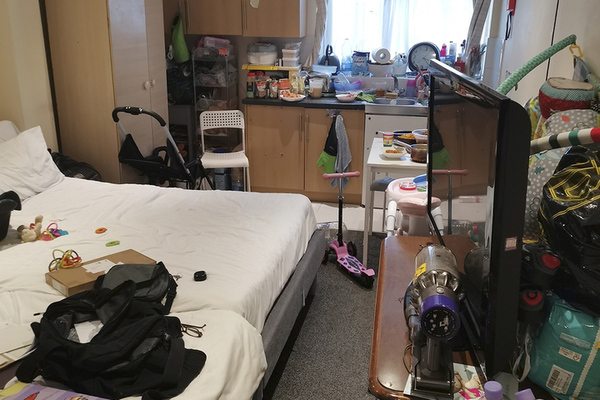You are viewing 1 of your 1 free articles
Latest figures show 14% rise in children in temporary accommodation in new record high
The government’s latest statutory homelessness figures have revealed that the number of children in temporary accommodation has increased by 14% on last year to a new record high.
Published today, the data showed that nearly 139,000 children were living in temporary accommodation in England at the end of June 2023.
This marks a rise of 7,430 more children in this type of housing than at the end of March this year.
The Department of Levelling Up Housing and Communities (DLUHC) data also showed that 68,070 families with children were living in temporary accommodation in England at the end of June 2023, of which 7,510 were living in hostels or B&Bs.
These stats for families with children living in B&Bs are up 93% compared with one year ago.
Under the Housing Act, it is unlawful for councils to keep pregnant women or households with children in temporary accommodation for more than six weeks. After this, the council must secure alternative suitable accommodation.
However, councils are struggling to find suitable temporary accommodation.
Families with children in B&Bs beyond the six-week legal limit are up 146% on a year ago and 39% on the previous three months.
At the same time, there has been an 18% increase in the number of households who were homeless and helped by councils as a result of a no-fault eviction compared with last year.
In total, 9,800 households approached their council as they were at risk of homelessness due to a no-fault eviction between April and June 2023.
The rising need for this accommodation type means councils have spent £1.74bn, including properties leased by local authorities, hostels, refuges and B&Bs, between April 2022 and March this year.
The latest figures have prompted a number of national charities to reiterate their calls for Section 21 to be abolished, alongside a commitment to building 90,000 genuinely affordable social homes a year in England. This includes 7,700 a year in Scotland, and 4,000 a year in Wales.
This commitment forms part of Inside Housing’s Build Social campaign that asks all the main parties in the UK to commit to a major programme of building homes for social rent in their manifestos for the next general election.
In response to the latest government stats, Polly Neate, chief executive of Shelter, said: “Today we’ve hit yet another shameful record in the housing emergency, with nearly 139,000 children now facing spending Christmas without a safe and secure place to call home.
“Decades of failure to build enough social homes combined with record-high private rents has resulted in more and more families being plunged into homelessness. For most, this will mean months or even years in temporary accommodation, where their lives are stuffed into cardboard boxes and they can be forced to move at the drop of a hat.
“To turn the tide on homelessness, the government must commit to building 90,000 genuinely affordable social homes a year. Until then, Shelter will be there to help people find or keep hold of a safe home.”
Darren Baxter, principal policy advisor at the Joseph Rowntree Foundation, explained that families with children are being left with “no choice but to live in unsuitable and costly temporary accommodation because of a lack of social housing”.
He called on the government to bring in the Renters’ Reform Bill and abolish Section 21 without any more delays.
Mr Baxter added: “The bill must also be strengthened so it actually provides private renters with greater security than they currently have. This should include doubling the notice period for tenants when evicted under new no-fault grounds to four months.
“Tenants should also be protected from eviction for two years at the start of a tenancy. We must also build more social housing so that children aren’t left languishing in temporary accommodation while they wait for a suitable home.”
Emma Haddad, chief executive at St Mungo’s, said: “We’re dealing with rising rates of homelessness, a cost of living crisis and now bitterly cold weather, and these combined are putting huge pressure on charities like St Mungo’s. Today’s quarterly homelessness statistics are a sad reminder that the number of people falling into homelessness is continuing to rise.
“The factors causing homelessness can be complex, but too often St Mungo’s frontline workers are supporting people who are in employment, they have lost secure housing and are unable to find a path back to a safe roof over their heads. We urgently need an increase in affordable and appropriate housing.
“We hope these statistics will galvanise policy action to bring in the Renters’ Reform Bill and abolish Section 21 evictions – a detrimental clause which currently allows landlords to evict tenants without reason.”
A DLUHC spokesperson said in response: “Everyone deserves a safe place to call home, that’s why we are spending £2bn over three years as part of a cross-government strategy to build homes for rough sleepers, give financial support for people to find a new home, and prevent evictions.
“We know building more homes is also a part of the solution and we are doing so as part of our long-term plan for housing. This also includes our multibillion-pound programme to build thousands of new affordable homes, with a large number for social rent.
“Our landmark Renters’ Reform Bill will also give tenants greater security in their home, and last week we increased the Local Housing Allowance so 1.6 million low-income households will be around £800 a year better off on average next year.”
Sign up for our homelessness bulletin
Already have an account? Click here to manage your newsletters












